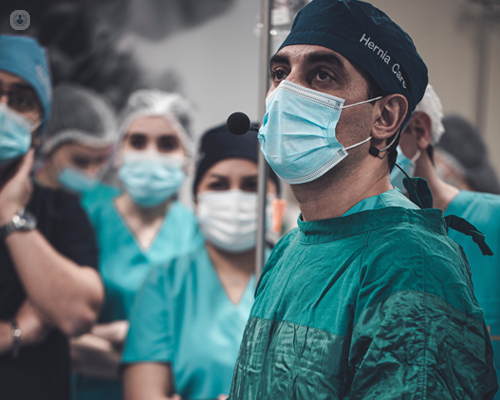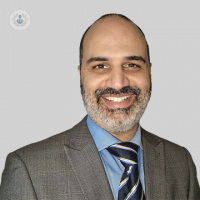FAQs on hernia surgery
Autore:A hernia is a common medical condition that can cause discomfort and pain, affecting the lives of many individuals. Seeking surgical solutions for hernia can be a daunting decision. In this article, leading transplant and general surgeon Mr Aimen Amer addresses some frequently-asked questions you may have about hernia surgery in a comprehensive and informative way.

What is a hernia?
A hernia occurs when an organ or tissue pushes through a weakened spot in the surrounding muscle or connective tissue. The most common types of hernia include inguinal (groin), umbilical (belly button), and incisional (resulting from previous surgeries). A hernia can lead to pain, discomfort, and even complications if left untreated.
Do hernias always require surgery?
Not all hernias require surgical intervention. In some cases, small hernias may not cause significant symptoms or complications, and your doctor may recommend a ‘watchful waiting’ approach. However, most hernias tend to worsen over time, so surgical repair is often the recommended treatment option.
How is hernia surgery performed?
Hernia surgery involves pushing the protruding organ or tissue back into its proper place and repairing the weakened abdominal wall. Two common surgical techniques are:
Open surgery
This traditional approach involves making an incision directly over the hernia and repairing the defect with sutures or a mesh patch.
Laparoscopic surgery
A minimally invasive option where small incisions are made, and a camera-guided instrument is used to repair the hernia with the help of mesh.
Your surgeon will discuss the most suitable approach based on your specific case.
What are the benefits of hernia surgery?
Hernia surgery offers several advantages:
- Relief from pain
Surgery can alleviate the discomfort and pain caused by the hernia, improving your quality of life.
- Preventing complications
Surgical repair reduces the risk of severe complications, such as bowel obstruction or strangulation.
- Quick recovery
Many patients can resume their regular activities within a few weeks after surgery.
Are there risks associated with hernia surgery?
Like any surgery, hernia surgery carries some risks, which may include infection, bleeding, chronic pain or recurrence of the hernia. However, these risks are relatively low, and your surgeon will take all necessary precautions to minimise them.
How long does recovery take?
Recovery time varies depending on the surgical approach and individual factors. In general, most patients can return to their daily activities within a couple of weeks. Your surgeon will provide specific post-operative instructions to aid your recovery.
Can hernias come back after surgery?
While hernia surgery is generally successful, there is a small risk of hernia recurrence. Factors such as smoking, obesity, and heavy lifting can increase this risk. To reduce the chances of recurrence, follow your surgeon's advice on lifestyle changes and precautions.
How do I prepare for hernia surgery?
Your surgeon will provide detailed instructions for pre-surgery preparation, including fasting guidelines and any necessary tests. Be sure to follow these instructions closely to ensure a smooth surgical experience.
In conclusion, hernia surgery can provide relief from the discomfort and potential complications associated with hernias. It’s essential to discuss your specific case with a healthcare professional to determine the best course of action. Remember that while surgery is a significant step, it can lead to improved quality of life and overall well-being for those dealing with hernias.
If you require expert hernia surgery, arrange a consultation with Mr Amer via his Top Doctors profile.


